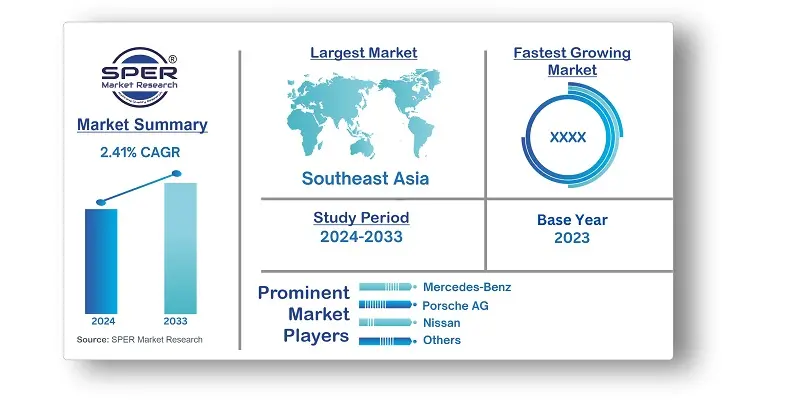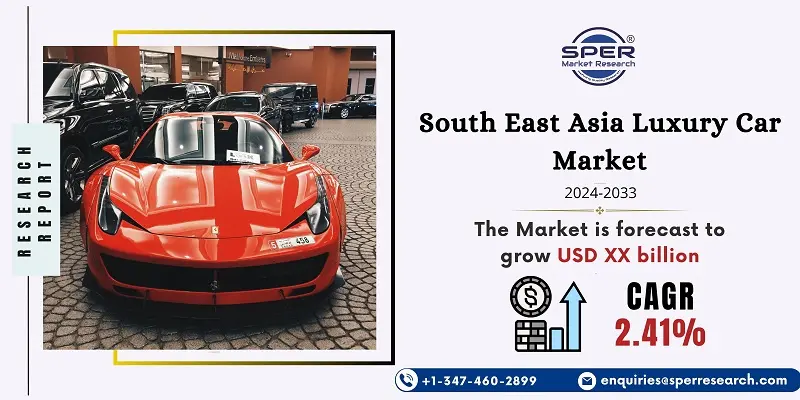
South East Asia Luxury Car Market Growth, Size, Trends, Demand, Revenue and Future Outlook
South East Asia Luxury Car Market Size- By Vehicle Type, By Fuel Type, By Price Range- Regional Outlook, Competitive Strategies and Segment Forecast to 2033
| Published: Sep-2024 | Report ID: AMIN24196 | Pages: 1 - 156 | Formats*: |
| Category : Automotive & Transportation | |||
- Lotus Technology Inc., a prominent luxury electric vehicle manufacturer, has inked agreements for USD 870 million in private investment in public equity (PIPE) funding. The funds are being raised to complete its proposed business combination with L Catterton Asia Acquisition Corp. (LCAA).
- The Competence Centre for E-drive Production will be established by Bayerische Motoren Werke AG in July 2020. The BMW Group has opened the Competence Centre at its largest production site in Dingolfing, with the aim of boosting its production for electric propulsion. Powertrain components like electric motors and battery modules will be produced by the company.


| Report Metric | Details |
| Market size available for years | 2020-2033 |
| Base year considered | 2023 |
| Forecast period | 2024-2033 |
| Segments covered | By Vehicle Type, By Fuel Type, By Price Range |
| Regions covered | Thailand, Malaysia, Singapore, Indonesia, Vietnam, Philippines, Rest of Southeast Asia |
| Companies Covered | Mercedes-Benz, Bayerische Motoren Werke AG (BMW), Honda Motor Co, Nissan, Jaguar Land Rover, Audi AG, Porsche AG, Tesla Inc, Volvo Group. |
- High-Net-Worth Individuals (HNWIs)
- Business Executives and Corporate Leaders
- Celebrities and Influencers
- Affluent Expatriates
- Luxury Car Enthusiasts and Collectors
- Government Officials and Diplomats
- High-Income Professionals (Doctors, Lawyers, etc.)
- Luxury Car Rental Services
- Luxury Hotel and Resort Owners
- Automotive Dealers and Distributors
| By Vehicle Type: |
|
| By Fuel Type: |
|
| By Price Range: |
|
- South East Asia Luxury Car Market Size (FY’2024-FY’2033)
- Overview of South East Asia Luxury Car Market
- Segmentation of South East Asia Luxury Car Market By Vehicle Type (Hatchback, Sedan, Sports Utility Vehicle)
- Segmentation of South East Asia Luxury Car Market By Fuel Type (Gasoline, Diesel, Electric)
- Segmentation of South East Asia Luxury Car Market By Price Range (Entry-Level, Mid-Level, High-End, Ultra)
- Statistical Snap of South East Asia Luxury Car Market
- Expansion Analysis of South East Asia Luxury Car Market
- Problems and Obstacles in South East Asia Luxury Car Market
- Competitive Landscape in the South East Asia Luxury Car Market
- Impact of COVID-19 and Demonetization on South East Asia Luxury Car Market
- Details on Current Investment in South East Asia Luxury Car Market
- Competitive Analysis of South East Asia Luxury Car Market
- Prominent Players in the South East Asia Luxury Car Market
- SWOT Analysis of South East Asia Luxury Car Market
- South East Asia Luxury Car Market Future Outlook and Projections (FY’2024-FY’2033)
- Recommendations from Analyst
1.1. Scope of the report1.2. Market segment analysis
2.1. Research data source
2.1.1. Secondary Data2.1.2. Primary Data2.1.3. SPER’s internal database2.1.4. Premium insight from KOL’s
2.2. Market size estimation
2.2.1. Top-down and Bottom-up approach
2.3. Data triangulation
4.1. Driver, Restraint, Opportunity and Challenges analysis
4.1.1. Drivers4.1.2. Restraints4.1.3. Opportunities4.1.4. Challenges
4.2. COVID-19 Impacts of the South East Asia Luxury Car Market.
5.1. SWOT Analysis
5.1.1. Strengths5.1.2. Weaknesses5.1.3. Opportunities5.1.4. Threats
5.2. PESTEL Analysis
5.2.1. Political Landscape5.2.2. Economic Landscape5.2.3. Social Landscape5.2.4. Technological Landscape5.2.5. Environmental Landscape5.2.6. Legal Landscape
5.3. PORTER’s Five Forces
5.3.1. Bargaining power of suppliers5.3.2. Bargaining power of buyers5.3.3. Threat of Substitute5.3.4. Threat of new entrant5.3.5. Competitive rivalry
5.4. Heat Map Analysis
6.1. South East Asia Luxury Car Market Manufacturing Base Distribution, Sales Area, Product Type6.2. Mergers & Acquisitions, Partnerships, Product Launch, and Collaboration in South East Asia Luxury Car Market
7.1. South East Asia Luxury Car Market Size, Share and Forecast, By Vehicle Type, 2020-20267.2. South East Asia Luxury Car Market Size, Share and Forecast, By Vehicle Type, 2027-20337.3. Hatchback7.4. Sedan7.5. Sports Utility Vehicle
8.1. South East Asia Luxury Car Market Size, Share and Forecast, By Fuel Type, 2020-20268.2. South East Asia Luxury Car Market Size, Share and Forecast, By Fuel Type, 2027-20338.3. Gasoline8.4. Diesel8.5. Electric
9.1. South East Asia Luxury Car Market Size, Share and Forecast, By Price Range, 2020-20269.2. South East Asia Luxury Car Market Size, Share and Forecast, By Price Range, 2027-20339.3. Entry-Level9.4. Mid-Level9.5. High-End9.6. Ultra
10.1. South East Asia Luxury Car Market Size and Market Share
11.1. South East Asia Luxury Car Market Size and Market Share By Region (2020-2026)11.2. South East Asia Luxury Car Market Size and Market Share By Region (2027-2033)11.3. Thailand11.4. Malaysia11.5. Singapore11.6. Indonesia11.7. Vietnam11.8. Philippines11.9. Rest of Southeast Asia
12.1. BMW AG
12.1.1. Company details12.1.2. Financial outlook12.1.3. Product summary12.1.4. Recent developments
12.2. Mercedes-Benz Group AG
12.2.1. Company details12.2.2. Financial outlook12.2.3. Product summary12.2.4. Recent developments
12.3. Nissan Motor Co. Ltd
12.3.1. Company details12.3.2. Financial outlook12.3.3. Product summary12.3.4. Recent developments
12.4. Honda Motor Co
12.4.1. Company details12.4.2. Financial outlook12.4.3. Product summary12.4.4. Recent developments
12.5. Jaguar Land Rover
12.5.1. Company details12.5.2. Financial outlook12.5.3. Product summary12.5.4. Recent developments
12.6. Audi AG
12.6.1. Company details12.6.2. Financial outlook12.6.3. Product summary12.6.4. Recent developments
12.7. Porsche AG
12.7.1. Company details12.7.2. Financial outlook12.7.3. Product summary12.7.4. Recent developments
12.8. Tesla Inc
12.8.1. Company details12.8.2. Financial outlook12.8.3. Product summary12.8.4. Recent developments
12.9. Volvo Group
12.9.1. Company details12.9.2. Financial outlook12.9.3. Product summary12.9.4. Recent developments
12.10. Others
SPER Market Research’s methodology uses great emphasis on primary research to ensure that the market intelligence insights are up to date, reliable and accurate. Primary interviews are done with players involved in each phase of a supply chain to analyze the market forecasting. The secondary research method is used to help you fully understand how the future markets and the spending patterns look likes.
The report is based on in-depth qualitative and quantitative analysis of the Product Market. The quantitative analysis involves the application of various projection and sampling techniques. The qualitative analysis involves primary interviews, surveys, and vendor briefings. The data gathered as a result of these processes are validated through experts opinion. Our research methodology entails an ideal mixture of primary and secondary initiatives.



Frequently Asked Questions About This Report
PLACE AN ORDER
Year End Discount
Sample Report
Pre-Purchase Inquiry
NEED CUSTOMIZATION?
Request CustomizationCALL OR EMAIL US
100% Secure Payment






Related Reports
Our Global Clients
Our data-driven insights have influenced the strategy of 200+ reputed companies across the globe.




















